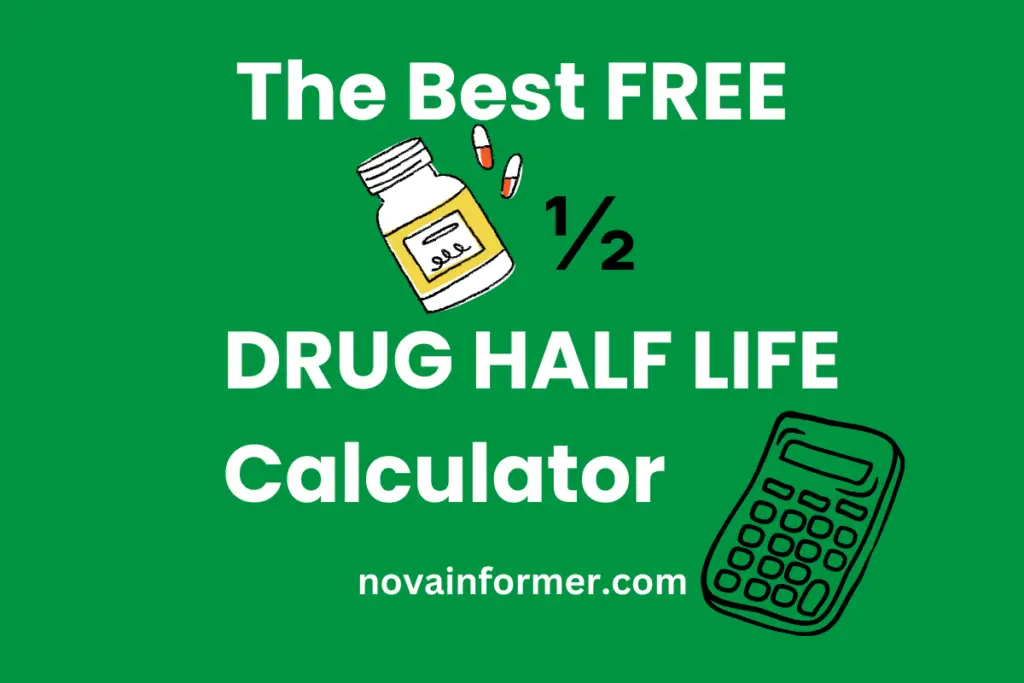Make medication decisions with our intuitive Drug Half Life Calculator. Optimize dosages and timing effortlessly.
There’s … mg left in your system.
… hours.
Key Takeaways:
- Drug half-life is the time it takes for a drug’s concentration to decrease by half in the bloodstream.
- Understanding factors like metabolism, organ function, and drug interactions is crucial for managing medications effectively.
- Drug half-life plays a significant role in determining dosage adjustments and monitoring therapeutic levels.
Introduction
Ever wondered why some medications require a once-a-day dose while others need to be taken more frequently?
The answer lies in a fascinating concept called Drug Half-Life. In simple terms, it’s the superhero cape of pharmacology, revealing how long a drug stays active in your system. Strap in; we’re diving deep.
Factors Influencing Drug Half-Life
Metabolism and Elimination
In the metabolic maze of our bodies, the liver takes center stage. It’s like the backstage crew determining how quickly or slowly a drug exits the scene. Check out this table for a sneak peek into how different drugs perform:
| Drug Name | Metabolism Rate | Half-Life |
|---|---|---|
| Aspirin | Rapid | Short |
| Diazepam | Moderate | Intermediate |
| Fluoxetine | Slow | Long |
Measurement and Calculation
Ever heard of the phrase “Math is everywhere”? Well, it’s true in pharmacology too. Scientists use various methods and formulas to calculate half-life. Let’s break it down with some real-world examples:
| Method | Formula |
|---|---|
| Plasma Concentration | T1/2 = 0.693/k |
| Area Under the Curve | T1/2 = 0.693xVd/Cl |
Significance in Drug Administration
Imagine playing a game of darts blindfolded; that’s what prescribing drugs without considering their half-life feels like. This section explores the clinical applications and why it matters:
- Clinical Applications: From pain management to psychiatric treatments, half-life guides clinicians in choosing the right dosage.
- Dosage Adjustment: For drugs with shorter half-lives, frequent doses might be necessary, while those with longer half-lives require patience.
Metabolism and Enzymes
Role of Liver Enzymes
Meet the liver’s A-team: Cytochrome P450 enzymes. They determine the pace of drug breakdown. Let’s give them a round of applause:
| Enzyme | Role |
|---|---|
| CYP3A4 | Metabolizes many medications, including statins |
| CYP2D6 | Breaks down antidepressants and opioids |
| CYP1A2 | Handles caffeine, among other things |
Renal Function
Your kidneys deserve a standing ovation for their role in drug excretion. Let’s see how they impact drug half-life:
| Kidney Function | Impact on Drug Half-Life |
|---|---|
| Normal | Expected half-life |
| Impaired | Prolonged half-life |
| Enhanced | Shortened half-life |
Drug Formulation
Not all drugs are created equal. Some prefer a quick sprint, while others take the marathon route. Let’s peek at how drug formulation influences half-life:
| Formulation Type | Half-Life Influence |
|---|---|
| Immediate Release | Shorter half-life |
| Extended Release | Prolonged half-life |
Drug Interactions
Ever wondered why your doctor asks about all the medications you’re taking? It’s like orchestrating a symphony; different drugs can either speed up or slow down the show. Check this out:
| Drug Interaction Type | Example |
|---|---|
| Inhibition | Drug A slows down the breakdown of Drug B |
| Induction | Drug A accelerates the breakdown of Drug B |
How to Use the Drug Half-Life Calculator
Welcome to our Drug Half-Life Calculator—a tool designed to make understanding medication dynamics a breeze. Here’s a quick guide on how to navigate this handy tool:
Step 1: Enter Your Data
Concentration Calculation
- Dose: Input the amount of the drug you took in milligrams.
- Time: Enter the time since you took the drug in hours.
- Half-Life: Provide the drug’s half-life in hours.
Time Until Left Calculation
- Dose: Specify the initial dose you took in milligrams.
- Half-Life: Input the drug’s half-life in hours.
- Left: Enter the amount of the drug you want to have left in your system in milligrams.
Step 2: View the Results
For both calculations, you’ll find the results displayed in the respective sections:
Concentration Calculation Result
- Result: The remaining amount of the drug in your system, given the provided parameters.
Time Until Left Calculation Result
- Result: The estimated time until the desired amount of the drug is left in your system.
Additional Tips
- Responsive Design: Our calculator is designed for easy use on various devices—whether you’re on a computer, tablet, or smartphone.
Start Calculating
That’s it! With just a few simple inputs, you’ll gain insights into how long a drug will remain in your system or when you’ll reach a specific drug concentration.
Feel free to play around with different scenarios and see how various factors impact drug half-life.
Ready to explore the dynamics of your medications? Give the Drug Half-Life Calculator a spin! 🚀 Let us know in the comments if you found it helpful or if you have any questions.
In Part 2, we’ll explore real-world implications and delve into clinical scenarios, so buckle up! 🚀 What questions do you have so far? Drop them in the comments below.
Key Takeaways for this section:
- Factors like metabolism, renal function, drug formulation, and interactions play pivotal roles in drug half-life.
- Understanding enzyme actions and organ impacts helps anticipate how medications will behave in the body.
- Different drug formulations affect how long they stick around, influencing dosage schedules.
Clinical Scenarios
Ever felt like decoding a prescription is akin to solving a cryptic puzzle? Well, welcome to the world of Drug Half-Life‘s real-world applications.
Examples of Drugs with Varying Half-Lives
Let’s take a stroll through the pharmaceutical garden and explore diverse drugs with different half-lives:
| Drug | Half-Life | Clinical Use |
|---|---|---|
| Morphine | 2-3 hours | Short-term pain relief |
| Warfarin | 20-60 hours | Anticoagulation for blood clot prevention |
| Prednisone | 2-3 hours | Anti-inflammatory for various conditions |
Case Studies in Treatment Plans
Meet Sarah, your hypothetical friend battling chronic pain. Her doctor prescribes Morphine, which has a short half-life. Here’s a glimpse into the thought process:
- Frequency of Administration: Due to Morphine’s short half-life, Sarah needs more frequent doses for sustained pain relief.
- Monitoring: Regular check-ins are essential to ensure the drug maintains therapeutic levels in her system.
Patient Education
Communicating Half-Life to Patients
Explaining drug half-life to patients can be as tricky as describing Wi-Fi to your grandma. Let’s simplify:
- Imagine a Roller Coaster: Short half-life is like a thrilling roller coaster—quick ups and downs. Long half-life is the lazy river—smooth and steady.
- Dosage Consistency: Emphasize the importance of sticking to the prescribed schedule for optimal effectiveness.
Adherence and Frequency of Administration
Adherence is the unsung hero of medication success. Here’s how half-life influences adherence:
- Daily vs. Weekly Medications: Drugs with shorter half-lives often require daily doses, while those with longer half-lives might only need once-weekly attention.
- Side Effects Management: Understanding half-life helps manage side effects by adjusting dosage timing.
Frequently Asked Questions
What is drug half-life?
Drug half-life is the time it takes for a drug’s concentration to reduce by half in the bloodstream.
How is drug half-life measured?
Scientists use various methods, such as plasma concentration and area under the curve, along with specific formulas for calculations.
Why do different drugs have different half-lives?
Factors like metabolism, renal function, and drug formulation contribute to variations in drug half-life.
How do age and gender affect drug half-life?
Age and gender can influence organ function, metabolism, and overall drug response, impacting drug half-life.
Can drug interactions impact half-life?
Absolutely! Some drugs can either slow down or speed up the breakdown of others, affecting their half-life.
Are there natural ways to influence drug metabolism?
While lifestyle factors like diet and exercise can influence metabolism, it’s crucial to consult with a healthcare professional before making significant changes.
What’s the significance of drug half-life in choosing medications?
Understanding drug half-life helps clinicians tailor dosage schedules, ensuring optimal therapeutic effects for patients.
How does drug formulation impact half-life?
Immediate release formulations often result in shorter half-lives, while extended release formulations lead to prolonged half-lives.
In Conclusion
In the journey through the intricate world of Drug Half-Life, we’ve unraveled mysteries, explored real-world scenarios, and tackled burning questions.
Now, let’s wrap it up with a final glance at the significance of understanding this pharmacological superhero.
The Essence of Drug Half-Life
- Medication Mastery: Grasping the concept of half-life empowers both healthcare providers and patients in making informed decisions about treatment plans.
- Dosage Dexterity: Tailoring dosages based on half-life ensures a delicate balance between therapeutic efficacy and minimizing potential side effects.
- Communication Catalyst: Bridging the gap between healthcare professionals and patients, understanding half-life fosters open dialogue and collaborative decision-making.
The Human Connection
Understanding drug half-life is not just a clinical exercise; it’s a human experience. It’s about Sarah managing chronic pain, Jack navigating hypertension, and Emily fine-tuning her treatment to minimize side effects. It’s about you, making informed choices about your well-being.
So, as we close this chapter, remember: drug half-life isn’t just a number; it’s your ally in the journey towards optimal health.
And there you have it—the ins and outs of drug half-life! 🎉 What questions are lingering in your mind? Let’s keep the conversation going in the comments below! What’s your experience with medication adherence? Share your thoughts! 🌈
License:
by



